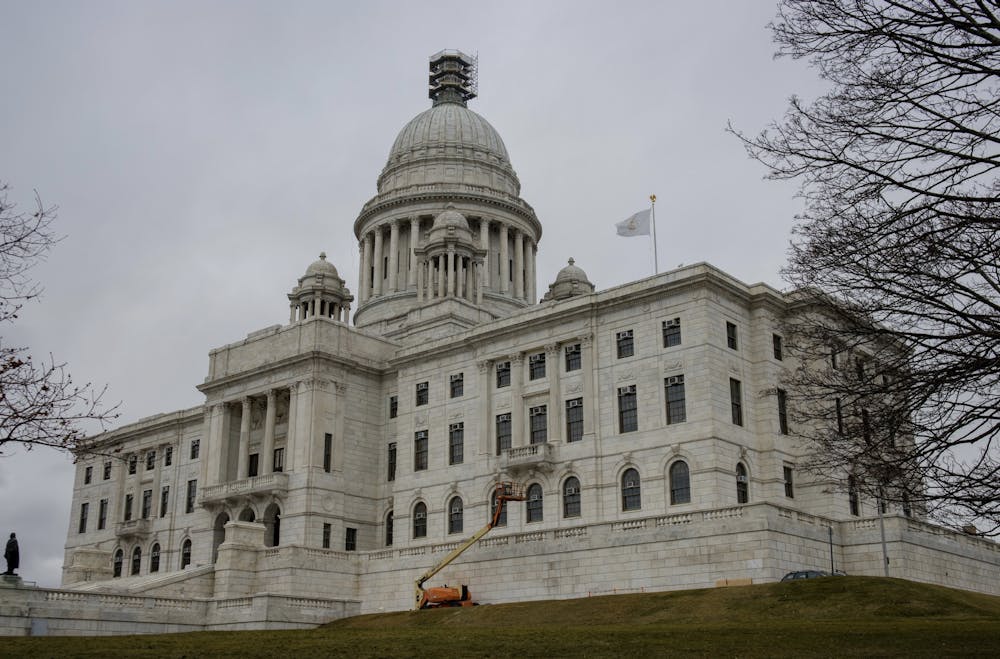On April 7, the Rhode Island Senate Judiciary Committee voted to hold bill S2779, which would amend the state constitution by removing a policy that requires residents to register to vote a minimum of 30 days before a state election.
At the hearing, Sen. Alana DiMario (D-North Kingstown, Narragansett, New Shoreham), who sponsored the bill, said that the amendment “would allow the voters of Rhode Island to decide if it is time to remove the outdated — and longest in the country — 30-day in advance voter registration deadline from the state constitution.”
“If approved by the voters, the power would lie with the registration deadline that reflects our modern election technologies and the needs of present-day Rhode Islanders,” she added.
Opponents of the bill testified citing concerns related to residency requirements, credibility and voter apathy.
According to Everton Prospere ’27, vice president of advocacy and community for Every Vote Counts, holding the bill “is not an unusual move.” In an email to The Herald, Prospere wrote that most committees hold bills to deliberate “after more extensive research.”
Secretary of State Gregg Amore (D) said at the hearing that same-day voter registration would improve voting accessibility and civic engagement. He also noted that people who become naturalized citizens late in the year might miss the registration deadline, which could exclude a large population from exercising their newly attained rights.
Amore also noted that same-day voter registration has already been implemented for presidential elections. “An average of 6000 voters in the last two presidential elections cast a same day vote when they registered … and the process worked,” he said.
Sandra Johnson, vice president of the League of Women Voters in RI, testified that low-income individuals, people of color and young people are more likely to move residences frequently, barring some voters from casting ballots due to missed deadlines.
“Allowing these voters to register on Election Day ensures that new voters or those who have recently moved can update their registration and immediately vote (with a) regular ballot,” Johnson testified.
On behalf of the Economic Progress Institute, Hector Perez-Aponte testified that voting barriers have historically been instituted to disenfranchise women and communities of color.
“It's just been a hard battle for so many to have that access and that right to vote,” he added. “But this bill, we believe, is a step further in taking down another barrier, allowing (more) individuals to participate in democracy.”
For opponents, the bill threatens the credibility of the voting system as canvassers “will not have the adequate time to vet people properly,” said Sarah Viera, one of two testifiers opposing the amendment. “When bad registrations occur … who will have to take the responsibility? It will be our local clerks and canvassers.”
Kenneth Atkinson expressed concerns about voter apathy: “If you want to vote hard enough for somebody, you’re going to get out and vote.” While Atkinson supports reducing the voter deadline, he opposes reducing it to less than “a few days.”
Another concern was residency requirements, which Viera attributed to the state’s “inflated voter rolls.”
She testified that the bill violated three laws: the R.I. General Law 17-1-3.1, which states that “a person’s residence for voting purposes is (theirs) fixed and established domicile”; section 8 of the National Voter Registration Act of 1993, which requires “states to implement procedures to maintain accurate and current voter registration lists” and Code 20507 in Title 52, which outlines “requirements with respect to administration of voter registration.”
Perez-Aponte was the only supporter of the bill to address this claim. “I know that there's been concerns (regarding) insecurity towards the election,” he said. “That has never been an issue.”
R.I. is one of 15 states with a 28 to 30-day voter registration policy. “This makes the state an outlier — specifically in the Northeast region — and more comparable to some southern states that, in recent years, have sought to restrict” voting rights, Prospere testified.
R.I. is also one of few states to codify their registration deadline in the state constitution, The Herald previously reported. Now that the bill has been held for further study, the Rhode Island General Assembly can reintroduce this amendment in the next legislative session.
But “the only time you can change the state constitution is in an election year,” John Marion, executive director of Common Cause R.I., previously told The Herald. At earliest, the referendum will appear on voter ballots in 2028.

Avani Ghosh is a Metro editor covering city and state politics. She is a junior from Ohio studying Health and Human Biology and International and Public Affairs. She is an avid earl grey enthusiast and can be found making tea in her free time.
Megan is a metro editor covering health and environment. Born and raised in Hong Kong, she spends her free time drinking coffee and wishing she was Meg Ryan in a Nora Ephron movie.





